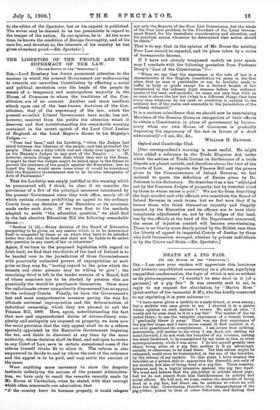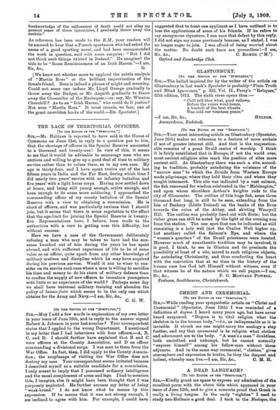DEATH AT A PIG FAIR.
[To THE EDITOE OF THE SPECTATOR:1 SIR,—I am sure your readers will appreciate this luminous and hitherto unpublished commentary on a phrase, signifying unqualified condemnation, the logic of which is not so evident as its picturesqueness : "I wouldn't be seen dead in it [of a garment] at a pig fair." It was recently sent to me, in reply to my request for elucidation, by "Marlin Ross" (joint-author of the immortal .R.M), who has kindly consented
to my reprinting it in your columns :—
" I have never given a necktie to a male friend, or even enemy; but a necktie was once given to me. I showed it to a person whose opinion on such matters I revere. He said at once, 'I would not be seen dead in it at a pig fair.' The matter of the tie ended there; to use the valuable expression of a female friend, I gradually threw it away.' That was my first experience of the pig-fair trope, and I have never ceased to find comfort in it, nor ever questioned its completeness. I am aware that nothing, presumably, will matter to me when I am dead, yet, casting my mind forward, I do not wish the beholder of my remains, casting his mind backward, to be scandalised by my taste in ties, or other accompaniments, while I was alive. I do not myself greatly care about being alive at a pig fair, neither is it an advantage, socially or otherwise, to be dead there. Yet this odium might be enhanced, could even be transcended, in the eye of the beholder, by the infamy of my necktie. To this point I have treated the beholder as a person able to appreciate the discredit, not only of my necktie, but also of being dead at a pig fair. There remains, however, and in a highly intensive manner, the pig fair itself. We trust and believe that the pig-jobber is critical about pigs; but we do not expect from him fastidiousness in artistic and social affairs. He will not, we hope, realise the discredit of being dead at a pig fair, but there can be neckties at which he will draw the line. Considering, therefore, the disapprobation of the pig-jobber, joined to that of other beholders, and finding that
foreknowledge of the callousness of death could not allay my present sense of these ignominies, I gradually threw away the necktie."
As reference has been made to the your readers will be amused to hear that a French sportsman who bad asked the name of a good sporting novel, and had been recommended the work in question, said with some surprise : "But I did not think such things existed in Ireland." He imagined the title to be "Some Reminiscences of an Irish Harem."—I am, [We know not whether more to applaud the subtle analysis of "Martin Ross" or the brilliant improvisation of the female friend. Here is indeed a phrase of might and meaning. Could not some one induce Mr. Lloyd George gradually to throw away the Budget, or Mr. Asquith gradually to throw away the Chancellor of the Exchequer,—or, say, Mr. Winston Churchill ? As to an "Irish Harem," who could do it justice? Not even "Martin Ross." It must remain, we fear, one of the great unwritten books of the world.—En. Spectator.]















































 Previous page
Previous page